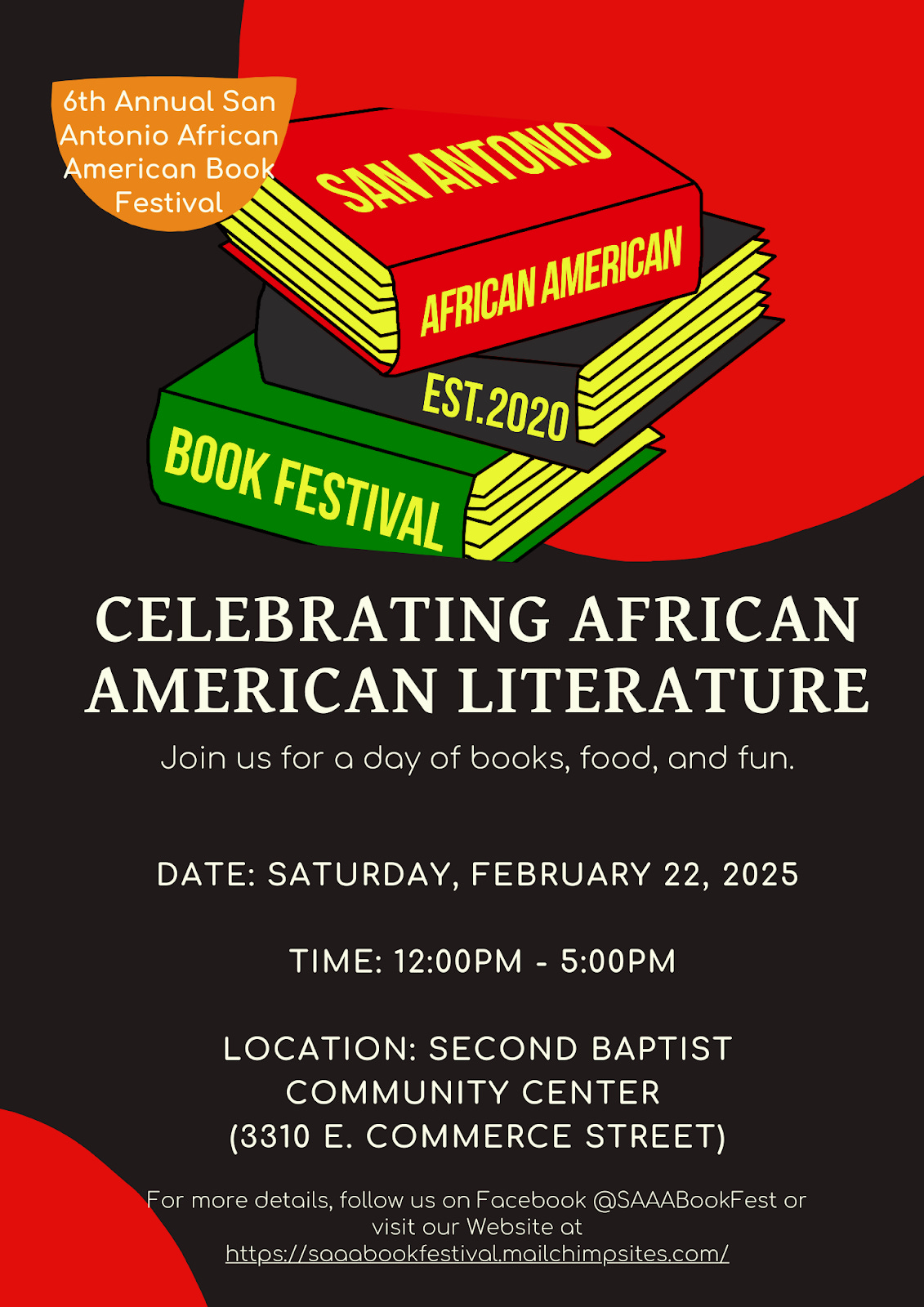Tea Time
Featuring the 6th Annual African American Book Festival in San Antonio, Episodes on Tea, Talking Thai Politics, Meet a Host, and the NBN YouTube channel
“I often find myself with more questions after finishing a book than I had before I started. Hosting gives me the opportunity to pose those questions directly to the authors, and it’s even better when I can share the insights from our exchanges with others who might be grappling with the same curiosities.”
In this week’s newsletter…
The 6th Annual African American Book Festival February 22 in San Antonio
3 Episodes On: Tea
Hosted Podcast: Talking Thai Politics
Meet a Host: Yadong Li
The NBN Book of the Day on YouTube
6th Annual African American Book Festival in San Antonio
Are you in Texas? Check out the San Antonio African American Book Festival this weekend! This fun literary event is held annually on the last Saturday of Black History Month. The festival provides a platform for African American authors to present and promote their work, as well as encourage reading from childhood onwards. The mission of the SAAA Book Fest is:
Celebrate the power of black literature: Black Literature has shaped our history, culture and who we are as a people
Reinforce the fact that representation matters: Studies show people are more likely to read when they have access to books written by authors they can identify with, about subjects and characters in a voice that resonates with them
Encourage black economics: Buying Black is more than a trend - it's a necessary way of life! Circulating Black dollars is one of the single most important things we can do to improve the economic health of the Black Community
Check out the exciting list of participating authors here. To learn more, visit the SAAA Book Fest website here, or email SAAABookFest@gmail.com
3 Episodes On: Tea
Did you know that most of the world uses a variant of tea or chá to refer to tea? This drink has been popular around the globe for centuries, and four tea production areas were designated Globally Important Agricultural Heritage Systems by the UN Food and Agriculture Organization (FAO). Learn about the most widely consumed drink (besides water) in these fascinating NBN interviews!
Listen to Debarati Sen discuss women tea farmers’ experience in Darjeeling, India. In her award-winning book, Everyday Sustainability: Gender Justice and Fair Trade Tea in Darjeeling, she explores Fair Trade-organic tea production and investigates why independent women small farmers growing tea on their own land experience market-based social justice regimes like Fair Trade differently from women wage laborers in tea plantations. Sen interrogates the benefits of Fair Trade, and the ways that women workers utilize sustainable development for their benefit.
Learn about American and Japanese teaways with Robert Hellyer in his NBN interview about his book, Green with Milk and Sugar: When Japan Filled America’s Tea Cups. His own family’s connection to the Japan-America tea trade goes back to the nineteenth century, and he weaves personal experience into this transnational history of Sencha green tea. You’ll learn about how Japanese preferences, Chinese tea production expertise, and American racism were part of this commodity’s history.
In December 2022, the Argentine national soccer team made headlines for bringing 240 kilograms (529 pounds) of yerba mate to Qatar for the World Cup. Check out Christine Folch’s examination of who drinks mate, why, and its popularization outside of South America. The Book of Yerba Mate: A Stimulating History investigates the production and consumption of yerba mate from precolonial Indigenous beginnings in South America to the present.
Hosted Podcast: Talking Thai Politics
Tune in to one of our newest hosted podcasts on the NBN, Talking Thai Politics. This compelling podcast was created by the Generation Thailand project at Nanyang Technological University, and is co-hosted by Duncan McCargo and Chayata Sripanich, with Li Xinruo serving as production assistant. Duncan kindly shared more of the story behind the podcast below.
Q: What led you to the topic of Thai politics?
A: It’s my fortieth anniversary this year: I first visited Thailand as an undergraduate student back in 1985 – a summer trip that led me ultimately to abandon my beloved English literature for graduate work in Southeast Asian studies and politics, following an intensive year spent studying Thai in Bangkok. I’m still struggling to explain exactly how all this happened, but since then I’ve researched and published on a wide range of issues concerning Thai politics, and spent several years living in the country. My work on Thailand is showcased on the Leeds Thai Politics website here.
Q: Can you describe what the Generation Thailand project is? And how did Talking Thai Politics come about?
A: When I took up my current post at Nanyang Technological University in Singapore in 2023, my new job came with a research grant to work on the topic of my choice. Fascinated by the political upheavals in Thailand over the past few decades, I decided to focus on unpacking recent movements for change through the lens of generational contestation. Fortunately, I secured a book contract from a leading US university press to write a book on the topic, but I wanted the Generation Thailand project to reach a wider public – which is why I wrote a podcast proposal into the grant application as well.
There was a very strange week in August 1992 when I received two job offers: one to become radio producer for the BBC World Service, and another for a lectureship at Queen’s University of Belfast. I took the lecturing position, but part of me always wished I could make radio programs instead of doing academic work. Fast forward 28 years to the first 2020 lockdown, when I was heading a research institute in Denmark and suddenly found that we could no longer hold meetings and seminars in person. With partners in Finland, Norway and Sweden we launched the Nordic Asia Podcast on the NBN, which rapidly became one of the world’s most popular Asian studies podcasts. It has published about 240 episodes and has received around 800,000 downloads to date. I also started making podcasts for the NBN Literature and Literary studies channels, and I became a regular host for New Books in Southeast Asian Studies.
(Browse Duncan’s NBN host profile to listen to more of his interviews and check out the Nordic Asia Podcast too!)
Q: What is the mission of Talking Thai Politics?
A: The idea behind Talking Thai Politics was to interview some of the people whose ideas and stories would feature in the book, and to share their perspectives on Thai politics with a global audience. There’s nothing quite like it out there, and Talking Thai Politics is obviously a bit niche, but our audience includes diplomats, journalists and people in the international development community, as well as the usual students and professors. Some Thai politicians have even been known to listen to the odd episode. We’d love to build higher listenership inside Thailand as well as beyond, and that is one of our goals for 2025.
If you haven’t heard the podcast yet and would like to get the flavor, I’d highly recommend the December 2024 episode we did with independent Senator Pornchai Witayalerdpan on the new Thai Senate, or the episode I co-hosted with my research associate Chayata Sripanich featuring human rights lawyer Kunthika Nutcharut. All our episodes are very tightly edited by our amazing production assistant Xinruo Li down to around 30 minutes to make for an enjoyable listen.
Are there any other guests that you can share that you will have on the podcast soon?
A: Over the next couple of months Talking Thai Politics will be featuring more academics talking about their cutting-edge writings on Thailand, as well as some activists and practitioners. The biggest challenge is finding guests who are comfortable speaking in English – anyone who would like to be on the show is very welcome to contact us!
Subscribe to Talking Thai Politics to hear more fascinating interviews!
Meet A Host: Yadong Li
Yadong Li is a graduate student training to be a socio-cultural anthropologist at Tulane University. His home base at the NBN is the Anthropology channel, but you can also find some of his interviews on the Chinese Studies, Folklore, and Music channels.
Q: Can you introduce yourself and share your areas of academic interest?
A: I am a socio-cultural anthropologist-in-training at Tulane University. I have a regional focus on China, particularly China’s northwestern borderlands. My research centers on the concept of hope, specifically how people cultivate it in situations of uncertainty and amidst the ruins of progress. Through tracing the transformation of a local medicinal plant into a healthcare commodity, I seek to understand how the residents of a decaying town navigate financial marginalization, infrastructural breakdown, and environmental challenges while maintaining their sense of hope.
Q: How did you first hear about the New Books Network?
A: I first came across the New Books Network in late 2021, while I was living in Edinburgh and pursuing my master’s degree. At the time, I often had to read books outside my main areas of expertise, and I wanted a way to get a sense of these works before diving in. I was especially curious to hear directly from the authors: why they decided to write, who they were engaging with, and what methods they used. That’s when I encountered the New Books Network, which turned out to be the perfect platform to satisfy my curiosity.
Q: Why did you decide to become a host for the NBN?
A: The reasons are always multifaceted, but at the core, it’s simple: an impulse to start conversations with interesting people and share the insights with a broader audience.
Also, I often find myself with more questions after finishing a book than I had before I started. Hosting gives me the opportunity to pose those questions directly to the authors, and it’s even better when I can share the insights from our exchanges with others who might be grappling with the same curiosities.
Q: What do you enjoy most about being an NBN host?
A: I most enjoy the opportunity to gradually learn different perspectives on the same subjects and to trace the implicit connections between works that might seem unrelated at first glance. For me, it’s fascinating to see how ideas intertwine across disciplines.
I also love the conversations themselves, especially those little moments when a guest turns the tables and asks me a question. Their questions often push me to revisit our conversation and reflect on their work in new and deeper ways.
Q: What episode has been your favorite to record?
A: Ha, that’s a tricky question! I genuinely enjoy every interview I’ve done, so it’s hard to pick a favorite. Each conversation with new book authors has been smooth, insightful, and a real pleasure. A big thank you to all the authors who accepted my invitation.
Some episodes stand out because they’ve been especially helpful to me as a scholar, such as my conversations with June Hee Kwon on Borderland Dreams: The Transnational Lives of Korean Chinese Workers, and with Jarrett Zigon on How Is It Between Us?: Regional Ethics and Care for the World. Chatting with Andrew Field was particularly fun. We dove into his book, Rocking China: Music Scenes in Beijing and Beyond, and the world of Chinese indie rock, a field I’m always enthusiastic about.
My interview with Ed Pulford about Past Progress: Time and Politics at the Borders of China, Russia, and Korea holds special meaning for me because he is one of the people who inspired me to become a host for the NBN in the first place.
Q: Are there any other NBN hosts you listen to that you’d like to recommend?
A: Alize Arican, who hosts the Anthropology channel and the Mobilities and Methods series, consistently delivers high-quality interviews. I’m especially fond of her episode with Ghassan Hage, The Diasporic Condition: Ethnographic Explorations of the Lebanese in the World.
I listened to NBN hosts Ed Pulford, Suvi Rautio, and Sarah Bramao-Ramos regularly during my early days with the NBN. Their work not only deepened my understanding but also taught me a lot about the art of interviewing. Some episodes I find myself often returning to are Dr. Pulford’s interview with Emily Ng on A Time of Lost Gods: Mediumship, Madness, and the Ghost After Mao, Dr. Rautio’s talk with Jerry C. Zee on Continent in Dust: Experiments in a Chinese Weather System, and Dr. Bramao-Ramos’s conversation with Benno Weiner on The Chinese Revolution on the Tibetan Frontier.
Q: If you could record an NBN interview with anyone, who would it be?
A: Hirokazu Miyazaki’s work on hope has profoundly shaped my understanding of the concept. His nuanced approach not only deepens my perspective but also provides a framework for how I think about hope, in both academic and everyday contexts. As I continue to develop my own research, I see Miyazaki’s work as a key point of reference and a conversation partner for the questions I want to explore. If he releases a new book or an edited volume, I would be more than happy to interview him and delve deeper into his evolving thoughts on hope.
Q: What advice would you give to anyone interested in becoming a host on the NBN?
A: I am still learning to be a good host. If I were to offer any advice, it would be: choose books that really spark your interest, read them thoroughly, and approach each conversation with your guest with the utmost respect and focus.
Q: Any advice specifically for graduate students who might be interested in becoming a host?
A: For any graduate student aspiring to be a host, my advice is simple: take it easy. You might stumble a bit in the beginning, and that’s okay. With time and experience, your skills will improve. After all, book lovers tend to be forgiving one another. The key, all in all, is to stay curious and passionate about the work.
Catch Yadong’s interviews on the NBN by subscribing to the New Books in Anthropology channel, and check out his host page listing all of his interviews here.
Is there a host that you’d like to learn more about? Email us or recommend them in the comments!
The NBN Book of the Day on YouTube
Do you use YouTube? Subscribe to the NBN YouTube Channel here to see the Book of the Day in your feed and listen there!
We also post Shorts, one-minute clips of recent interviews that you can like, comment on, and easily share with others! Check out a recent Short featuring Melissa Deckman discuss her book, The Politics of Gen Z: How the Youngest Voters Will Shape Our Democracy, and listen to the full interview!








